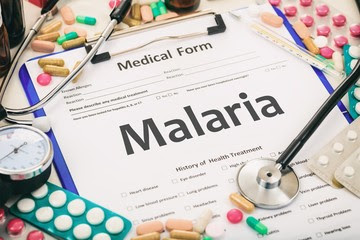What is Malaria?
Malaria is a serious and sometimes fatal disease caused by a parasitic infection transmitted to humans through the bite of infected mosquitoes. The parasites responsible for malaria belong to the Plasmodium family, and there are several different species that can infect humans. The most severe and life-threatening form of malaria is caused by the Plasmodium falciparum parasite.
How Many Tyupe of Malaria?
There are five main types of malaria caused by different species of the Plasmodium parasite:
- Plasmodium falciparum - the most severe form of malaria, responsible for most malaria-related deaths.
- Plasmodium vivax - the most common type of malaria outside of Africa, it can form dormant liver stages, causing relapses months or years after the initial infection.
- Plasmodium Malaria - causes a chronic but milder form of malaria, with symptoms that can persist for years.
- Plasmodium Ovalle -a rare type of malaria that is similar to P. vivax, but with a lower prevalence.
- Plasmodium Knowlesi - a type of malaria that primarily infects monkeys, but can also infect humans in Southeast Asia. It has a rapid onset and can cause severe illness.
It is important to note that malaria can also present differently depending on the individual, and in some cases may be caused by more than one species of the Plasmodium parasite.
Plasmodium falciparum is caused by several factors, including:
Mosquito bites: The parasite is transmitted to humans through the bites of infected Anopheles mosquitoes.
Parasitic life cycle: Once inside the human body, the parasites multiply rapidly and invade red blood cells, causing symptoms of malaria.
Lack of immunity: People who have not been previously exposed to Plasmodium falciparum are at higher risk of developing severe malaria because they lack immunity to the parasite.
Genetic factors: Some people may have genetic factors that make them more susceptible to severe malaria.
Environmental factors: Environmental factors such as climate change, deforestation, and urbanization can increase the risk of malaria transmission by creating conditions that favor mosquito breeding and survival.
Resistance to medication: Resistance to antimalarial drugs is a growing problem, making it more difficult to treat and control Plasmodium falciparum infections.
Poor health infrastructure: Limited access to healthcare and inadequate resources for malaria control can also contribute to the spread of Plasmodium falciparum.
What is the best treatment of Plasmodium falciparum?
Plasmodium falciparum is the most virulent species of the malaria parasite that causes severe malaria. Treatment for Plasmodium falciparum infection depends on the severity of the disease, age of the patient, pregnancy status, and drug resistance in the area.
The World Health Organization (WHO) recommends artemisinin-based combination therapies (ACTs) as the first-line treatment for uncomplicated Plasmodium falciparum malaria. The artemisinin component rapidly reduces the number of parasites, and the partner drug clears the remaining parasites from the bloodstream. Commonly used ACTs include artemether-lumefantrine, articulate-mefloquine, and articulate-amodiaquine.
For severe Plasmodium falciparum malaria, intravenous (IV) articulate is the first-line treatment according to WHO guidelines. IV quinine is an alternative if IV articulate is not available. The choice of treatment also depends on the availability of healthcare facilities, the level of healthcare providers, and the patient's condition.
It is important to note that drug resistance is a growing concern for malaria treatment worldwide, and local resistance patterns should be taken into account when selecting treatment options. Moreover, preventive measures such as insecticide-treated bed nets and chemoprophylaxis for travelers to endemic areas can reduce the incidence of Plasmodium falciparum infection.
Which food eat and avoid in Plasmodium falciparum?
Here are some dietary tips to follow while dealing with P. falciparum:
Foods to Eat:
Fresh fruits and vegetables: Eating a variety of fresh fruits and vegetables can provide essential vitamins and minerals, such as vitamin C and iron, which can help to strengthen the immune system and promote recovery.
Lean protein: Lean proteins, such as chicken, fish, and beans, can provide essential amino acids that can help to repair and maintain body tissues.
Complex carbohydrates: Complex carbohydrates, such as whole-grain bread, rice, and pasta, can provide energy and important nutrients such as fiber.
Fluids: Drinking plenty of fluids, such as water, herbal teas, and fresh juices, can help to prevent dehydration, a common complication of malaria.
Foods to Avoid:
Alcohol: Alcohol can dehydrate the body and weaken the immune system, making it harder for the body to fight the infection.
Sugary and processed foods: These foods can cause a spike in blood sugar levels and provide little nutritional value, which can weaken the immune system.
Fatty and fried foods: These foods can be harder for the body to digest and can cause inflammation, which can worsen symptoms.
Caffeine: Caffeine can dehydrate the body and worsen symptoms such as headache and fever.
It is important to note that if you suspect you have malaria, it is essential to seek medical attention as soon as possible. A healthcare professional can diagnose the condition and provide appropriate treatment, which may include medication and supportive care.
1. What causes malaria in humans?
2. What are the common symptoms of malaria?
3. How is malaria diagnosed and treated?
4. Can malaria be prevented, and if so, how?
5. What regions of the world are most affected by malaria?





.png)



0 Comments
please do not enter spam link in the comment box.